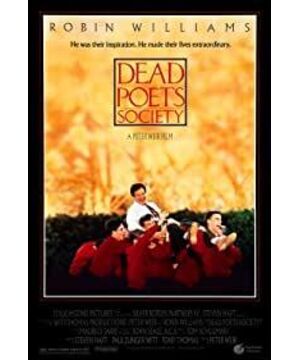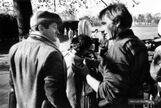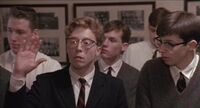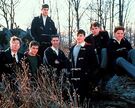The film tells the story of an aristocratic middle school with conservative school spirit, rigorous teaching and high enrollment rate in the United States. The new Chinese teacher Keating uses anti-traditional innovative heuristic teaching to lead students into the palace of literature, let students know themselves and think about life , Pursue dreams. Unexpectedly, Keating’s enlightenment made Neil, who had originally obeyed his father’s plan to study medicine, wanted to choose acting art according to his own preferences. However, he chose to commit suicide under the high pressure of his father’s opposition. The school blamed Keating on the responsibility. When the teacher was about to leave school, the students who agreed with the teacher stood on the table and said "Oh, captain, my captain!" to express the belief that the teacher conveyed to them will always exist in their hearts. Teacher Keating's education is like a spring breeze, and the moisturizing thing is silently left in everyone's heart.
What does the portrait of a good teacher look like?
I am very happy with Teacher Keating's class:
"When the breeze is blowing gently and the leaves are swaying slightly on the branches, my heart is also swirling in a smile." The
first lesson :
Instead of staying obediently in the classroom, he showed the students to look at the photos in the school history building and asked them to look carefully at the faces of the outstanding students in the past. The teacher said, "They have the same hairstyles as you, and they are full of hormones. , I also feel that the world is invincible, and their eyes are full of confidence and hope. However, when they really want to give play to their strengths and prove themselves, they are no longer given. Now they are all in the soil, no matter who it is, everyone will stop one day Breathing, body freezing, and then dying. However, if you listen carefully, you will still hear the secret they want to say-seize the day, boys, make your lives extrordinary." (Grab today, children! Create you extraordinary的
生活) Seize the day (Grasp the present)
“I went to the woods because I wished to live deliberately, to front only the essential facts of life, and see if I could not learn what it had to teach, and not, when I came to die, discover that I had not lived …" Henry David Thoreau
"I stepped into the jungle because I want to live meaningfully. I want to live deep and absorb all the essence of life. Then learn from it so as not to let me At the end of life, I found that I had never lived." Thoreau
"Keating's Guide to Frost's Poems-The Road Not Taken"
TWO roads diverged in a yellow wood,
And sorry I could not travel both
And be one traveler, long I stood
And looked down one as far as I could
To where it bent in the undergrowth;
Then took the other, as just as fair,
And having perhaps the better claim,
Because it was grassy and wanted wear;
Though as for that the passing there
Had worn them really about the same,
And both that morning equally lay
In leaves no step had trodden black.
Oh, I kept the first for another day!
Yet knowing how way leads on to way,
I doubted if I should ever come back.
I Telling the this with BE a of shall sigh
Somewhere AGEs and AGEs hence:
two Roads diverged in a Wood, I- and
the I Took at the One less Traveled by,
and that has Made All at the -difference.
golden woods there are two paths fork
Unfortunately, I can not walk along two paths;
I stood there a long time bifurcation place
ahead in the end which overlooks a road;
until it turns, disappeared in the depths of the forest.
Then I resolutely embarked on another road,
this road may be more worthy of my yearning,
because it is overgrown with grass and is inaccessible;
but when it comes to deserted and desolate, the
two roads are almost the same.
Both roads were covered with fallen leaves that morning, and
there were no traces of being trampled on the fallen leaves.
Alas, I leave the first way to the future!
But I know that there are many terraces in the world, and
I don't know if I can come back there again in the future.
I will sigh while narrating that
somewhere, a long, long time later;
there were two paths that broke up in the woods,
I chose a sparsely-traveled walk,
and everything afterwards was completely different.
"Choose the way ahead bravely and embark on a road less
traveled " "The Road Not Taken " is Frost's masterpiece. This poem contains a very rich philosophy of life-how to make appropriate "choices" in the road of life full of "diversions" is an important subject of life. Every choice is critical to the future, and one must not be careful, because any different choice may be a turning point for people's lives. But what kind of choice is correct? This is of course a matter of opinion, because no one can predict the future, and life can only go forward recklessly and cannot start again. In the poem, Frost chooses to take a road off the beaten track, which seems to imply that the reader does not need to blindly follow the life's choices and follow the trend. You may wish to have the courage to find another way and try to start a new situation with curiosity and risk.
Take Neil as an example. Under the concept of seeking fame, his father asked him to absolutely obey his will and give up his own interests. Learning became a means to obtain future survival or social status. How to choose is the "wrong way of life" that many young people must face. How to make a choice requires wisdom, foresight, and courage. It is regrettable and puzzling that Neil chose to end his life. Of course, this is a conflict that the screenwriter will inevitably bury, but Neil's suicide is really a pity in my heart.
Have you ever met a good teacher who teaches like Teacher Keating, who teaches you to read poems, think about the meaning of life, and inspire your soul? When everyone tells you that reading is an exam, the exam is for fame, and the fame is for adults; when the mode of learning becomes repeated filling, memorizing formulas, not asking for detailed solutions, only asking for scores. He teaches you to watch the journey of life in different ways, and also stimulates your potential, makes you love life, encourages you to have the courage to take risks and pursue dreams, and allows you to see a more beautiful and different world.
"O CAPTAIN! MY CAPTAIN!"
O Captain! my Captain! our fearful trip is done,
The ship has weather'd every rack, the prize we sought is won,
The port is near, the bells I hear, the people all exulting,
While follow eyes the steady keel, the vessel grim and daring;
But O heart! heart! heart!
O the bleeding drops of red,
Where on the deck my Captain lies,
Fallen cold and dead.
O Captain! my Captain! rise up and hear the bells;
Rise up&emdash;for you the flag is flung&emdash;for you the bugle trills,
For you bouquets and ribbon'd wreaths&emdash;for you the shores a-crowding,
For you they call , the swaying mass, their eager faces turning;
Here Captain! dear father!
The arm beneath your head!
It is some dream that on the deck,
You've fallen cold and dead.
My Captain does not answer, his lips are pale and still,
My father does not feel my arm, he has no pulse nor will,
The ship is anchor'd safe and sound, its voyage closed and done,
From fearful trip the victor ship comes in with object won:
Exult O shores, and ring O bells!
But I with mournful tread,
Walk the deck my Captain lies,
Fallen cold and dead.
Oh. Captain, my captain! Our sinister voyage is over,
our boat has survived the rough seas, and the rewards we seek have been won.
The port is not far away, I have heard the bells, thousands of people are cheering and shouting,
watching our ship return calmly, our ship is majestic and brave.
However, my heart ah
oh. Red blood dripping down,
on the deck, there lay my captain,
he was down, dead, and cold.
Oh, captain, my captain! Get up, please listen to the bell, get
up,-the flag, call for you-the horn, ring for you.
For you. The shore is full of people—for you, countless bouquets, ribbons, and garlands.
For you, the hustle and bustle of the crowd are calling, turning their eager faces.
Here, Captain! Dear father!
Under your head is my arm!
This is a dream on the deck.
You have fallen, died, and have cooled down.
Our captain did not answer. His lips were pale and silent.
My father could not feel my arm. He had no pulse or life.
Our ship was anchored and anchored safely. The voyage was completed and ended. The
victorious ship Returning from the sinister journey, what we seek has been won.
Cheers, oh coast! Rumble, oh Hong Zhong!
However, I moved my sad steps lightly.
On the deck, there lay my captain.
He was down, dead, and cold.
View more about Dead Poets Society reviews






